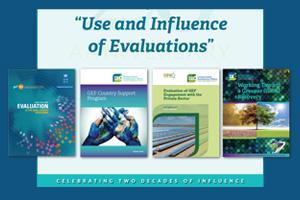During the GEF 7th Assembly the IEO organized an interesting discussion on the "Influence and Use of Evaluations." This event focused on how evaluations shape impactful decisions to help countries in a path to a greener future. Geeta Batra, Chief Evaluation Officer, moderated a…
IEO Side Event at the 7th GEF Assembly - Use and Influence of Evaluations
Announcement - IEO GEF 7th Assembly Side Event
IEO 20th Anniversary
Commemorating 20 Years of Excellence, Accountability, and Innovation by the GEF Independent Evaluation Office" marks the remarkable 20-year journey of the IEO, which was established in 2003 with the mission to provide independent evaluations of Global Environment Facility (GEF) programs and…
Brochure - IEO 20th Anniversary
IPDET 2023 - Juha I. Uitto Interview
In July 2023, the IEO team delivered a Workshop on Evaluating at the Nexus of Environment and Development at IPDET. The workshop was highly participatory and well-received. In this interview, Juha explains the importance of evaluators paying…
Book - Conflict-Sensitive Conservation
This book provides an empirically formulated foundation for conflict-sensitive conservation, a field in which the existing literature relies primarily on anecdotal evidence.
Seeking to better understand the impact of conflict on the implementation and outcomes of environmental projects,…
Lower Mekong River Basin Ecosystem
This video highlights the findings and recommendations of the first strategic country cluster evaluation (SCCE) in the Lower Mekong River Basin (LMRB) conducted by the Independent Evaluation Office of the Global Environment Facility (GEF IEO). The Mekong River Basin is a vital ecosystem that…



